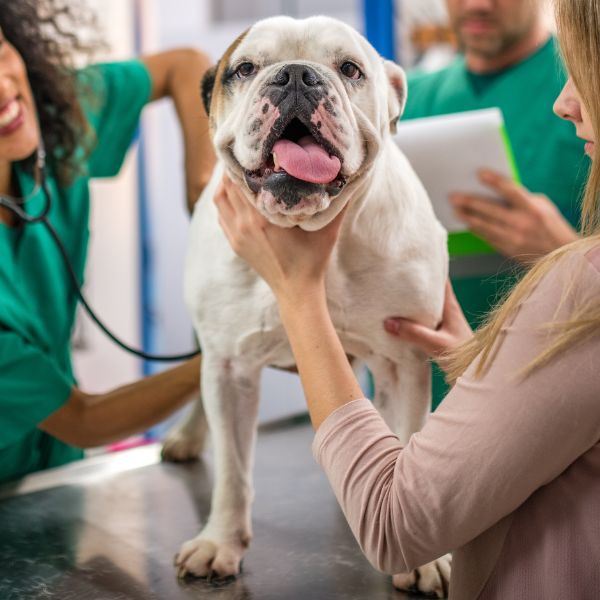Services
Pet Bloodwork and Diagnostic Testing
When you bring your pet in for their annual visit, your veterinarian may recommend blood work, fecal testing, and urinalysis (urine testing) as part of their wellness exam.
Pet Bloodwork and Diagnostic Testing in Rancho Cucamonga, CA
Some pet owners might wonder if blood work and urine testing are really necessary. Even when your pet seems fine, the answer is yes!
Does My Pet Need Blood, Fecal & Urine Testing?
Our pets cannot tell us how they feel and often hide feelings of pain or discomfort. Testing healthy pets’ blood and urine during a wellness visit also provides baseline values to compare as they age. This baseline allows veterinarians to detect changes and illness before ever seeing outward signs of disease.
Routine blood work and urine testing, in combination with a physical exam, give veterinarians a full picture of your pet’s overall health. Much like when your doctor performs tests during your annual physical, pet blood work and urinalysis allow for early detection of some common diseases and help monitor existing concerns.
If these diagnostic tests uncover any ailment, early detection creates the most significant success rate for either curative treatment or management. In short, diagnosing disease early is key to helping keep your pet healthy longer.
Common blood tests used by veterinarians
- Complete Blood Count (CBC) and Other Blood Tests: A complete blood count (CBC) test analyzes the numbers and appearance of blood cells. CBC testing is important in the diagnosis and monitoring of disease and infection. Blood samples are usually taken by the veterinary staff for analysis. There are three main parts of a CBC dedicated to providing information about red blood cells, white blood cells, and platelets.
- Fecal Tests: Stool samples may be collected by the pet owner before an appointment, or the veterinarian may collect them. A small portion of the stool sample may be directly applied to a glass slide or processed within a fluid. The material is then examined under a microscope. The purpose of using certain fluids before stool examination is to detect the presence of the cysts of parasites such as Giardia and Cryptosporidium or eggs of other parasites, such as roundworms, hookworms, and tapeworms. Larva, adult worms, or tapeworm segments may also be observed.
- Urine Tests: Analysis of urine samples (urinalysis) is important for detecting various types of urinary tract diseases. The tests usually carried out on urine samples include evaluating the appearance, chemistry, and sediment. Normal urine is yellow or amber and should be transparent or clear. Diseases or infections may change the color or clarity. For most pet species, normal urine has a slight odor of ammonia; however, some pets (such as cats) normally have a pungent odor. A bacterial infection of the urinary tract may produce a strong ammonia odor in the urine. If your veterinarian suspects a bladder infection, a urine sample to culture for bacteria may be collected directly from the bladder using a needle and syringe. This process is called cystocentesis.
Benefits of In-House Diagnostics and Bloodwork
When your pet is sick, you don’t want to wait days to get the results of blood tests and start their treatment. Our in-house diagnostic lab decreases the time and energy necessary to get your pet the necessary blood tests. Plus, you’ll get the results much quicker than using an outside lab, and your pet will only have to deal with one technician and one visit.
Having a sick pet can be scary. After all, they are part of the family. Baseline Animal Hospital wants to ease some of your anxiety and quickly get your pet on the road to wellness. That’s why we’ve invested in an in-house diagnostic lab. Call us today at (909) 987-4788 to learn more about our in-house testing lab or to make an appointment for your pet.
Outside Laboratory
Many of the tests we use to diagnose disease require either specialized equipment or training. For these reasons, we have the option to send samples to an outside laboratory. Some tests are similar to those available in the clinic, but advanced testing equipment and quality control procedures in a specialized facility may offer advantages in speed and accuracy. For example, the specialized laboratory will usually have staff pathologists to identify abnormal red or white blood cells, both of which can help confirm a disease diagnosis, during routine tests on a blood sample.
In addition, at an outside laboratory, specialized tests may be performed, such as one to detect larval stages of parasites that are not easily found on standard tests. Conveniently, samples are picked up right from our office, so there is no need to bring your pet to another location for the testing.

